
Archives of Thermodynamics
Scope & Guideline
Innovating Insights into Thermodynamic Processes
Introduction
Aims and Scopes
- Thermal Management and Heat Transfer:
Research on heat transfer mechanisms, including conduction, convection, and radiation, particularly in relation to advanced materials and nanofluids. - Energy Systems and Renewable Energy:
Studies exploring the efficiency and performance of renewable energy systems, including solar, wind, and geothermal technologies. - Thermodynamic Analysis and Optimization:
Analyses focusing on optimizing energy systems and processes, including the use of exergy and thermodynamic cycles. - Numerical and Experimental Simulations:
Emphasis on computational methods and experimental validation for studying complex thermal and fluid dynamics. - Advanced Materials and Nanotechnology:
Investigation into the thermophysical properties and applications of nanomaterials and phase change materials in thermal systems. - Environmental Impact and Sustainability:
Research addressing the environmental implications of thermal processes and the development of sustainable energy solutions.
Trending and Emerging
- Nanofluids and Advanced Heat Transfer Fluids:
A significant increase in research on nanofluids highlights their potential to enhance heat transfer in various applications, including cooling systems and energy storage. - Renewable Energy Integration and Optimization:
There is a growing trend towards optimizing renewable energy systems, with a focus on integrating various energy sources and improving their efficiency. - Thermal Energy Storage Solutions:
Emerging studies on phase change materials and other thermal energy storage technologies are becoming increasingly relevant for enhancing energy efficiency. - Computational Fluid Dynamics (CFD) Applications:
The use of CFD for simulating complex thermal and flow processes is on the rise, facilitating advanced investigations into heat exchange systems. - Sustainable and Green Technologies:
Research on sustainable technologies, including waste heat recovery and environmentally friendly refrigerants, is gaining prominence as industries seek to reduce their carbon footprint.
Declining or Waning
- Traditional Fossil Fuel Technologies:
Research related to traditional fossil fuel combustion and thermodynamic cycles has diminished, as there is a growing shift towards renewable energy sources. - Basic Heat Transfer Principles:
Basic studies on fundamental heat transfer principles are less frequent, possibly overshadowed by more complex and applied research involving advanced materials and nanofluids. - Conventional Refrigeration Systems:
Research on conventional refrigeration technologies appears to be waning, likely due to the increasing focus on alternative refrigerants and energy-efficient systems. - Static Thermal Systems:
Investigations into static or non-dynamic thermal systems are becoming less common in favor of more dynamic, complex thermal interactions involving fluid flows. - Single-Phase Flow Studies:
Research specifically focusing on single-phase flow dynamics has decreased, as multi-phase and complex fluid interactions are becoming more prevalent.
Similar Journals

HEAT TRANSFER RESEARCH
Innovating Insights in Heat Transfer and Fluid FlowHEAT TRANSFER RESEARCH is a leading academic journal published by Begell House Inc that focuses on the dynamic and evolving fields of heat transfer, fluid flow, and mechanical engineering. With an ISSN of 1064-2285 and an E-ISSN of 2162-6561, this journal serves as a critical platform for researchers and professionals seeking to disseminate innovative findings and advancements in these interrelated disciplines. Covering converged years from 1992 to 2024, HEAT TRANSFER RESEARCH has established its impact in the academic community, achieving a 2023 ranking of Q3 in Condensed Matter Physics and Q2 in Fluid Flow and Transfer Processes. It currently occupies a percentile rank ranging from 44th to 54th across several Scopus categories, underscoring its relevance and contribution to the scientific discourse. While Open Access options are not available, the journal remains committed to providing high-quality research and insights that shape the future of thermal sciences. Accessible to both seasoned professionals and aspiring students, HEAT TRANSFER RESEARCH is indispensable for anyone looking to stay ahead in the ever-changing landscape of engineering and applied physics.

THERMAL ENGINEERING
Transforming Thermal Engineering for Tomorrow's ChallengesTHERMAL ENGINEERING is a premier journal dedicated to advancing the field of thermal engineering, with particular importance in the domains of Energy Engineering, Nuclear Energy, and Power Technology. Published by PLEIADES PUBLISHING INC, this esteemed journal has been providing significant scholarly contributions since its inception, with its converged years spanning from 1970 to 2024. Though currently non-open access, the journal presents a unique avenue for researchers, professionals, and students to explore groundbreaking research and innovative solutions related to energy systems and thermal processes. With a notable impact factor and positioned in the Q3 quartile for both Energy Engineering and Nuclear Energy, THERMAL ENGINEERING ensures the dissemination of high-quality research with a global reach, making it an essential resource for those looking to stay at the forefront of essential energy technologies and engineering advancements.
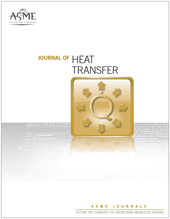
JOURNAL OF HEAT TRANSFER-TRANSACTIONS OF THE ASME
Fostering Innovation in Heat Transfer Technologies.JOURNAL OF HEAT TRANSFER-TRANSACTIONS OF THE ASME, with ISSN 0022-1481 and E-ISSN 1528-8943, is a leading publication in the field of heat transfer, mechanical engineering, and related disciplines, published by the renowned American Society of Mechanical Engineers (ASME). This esteemed journal, which has been in circulation since 1945, provides a platform for novel research findings and reviews that the mechanical engineering community can rely upon, contributing significantly to the advancement of knowledge in heat transfer processes. The journal is recognized for maintaining a strong impact in several categories, attaining Q2 quartile rankings in Condensed Matter Physics, Mechanical Engineering, and Mechanics of Materials, reflecting its influential role in shaping scientific dialogues. With a commendable Scopus ranking, including a percentile of 63rd in Mechanical Engineering, it attracts submissions from leading researchers and industry professionals alike. Although access options are currently undergoing changes, the commitment to disseminating cutting-edge research remains steadfast. Gathering insights from historical and contemporary studies, the JOURNAL OF HEAT TRANSFER stands as a vital resource for those aiming to innovate in heat transfer technologies and methodologies.

Computational Thermal Sciences
Exploring the Nexus of Energy and MathematicsComputational Thermal Sciences, an esteemed journal published by BEGELL HOUSE INC, presents cutting-edge research at the intersection of computational mathematics, energy engineering, and fluid dynamics. With an ISSN of 1940-2503 and an E-ISSN of 1940-2554, this journal aims to disseminate high-quality research articles, reviews, and methodologies that improve our understanding of thermal processes and their applications. Renowned for its solid impact in the field, it holds a Q3 ranking in multiple categories including Computational Mathematics and Energy Engineering for 2023. As the field evolves, the journal continues to play a pivotal role in bridging theoretical research with practical innovations, thereby catering to a diverse audience of researchers, professionals, and students. Although it operates on a subscription model, the journal ensures accessibility to significant contributions in thermal sciences from 2009 to 2024, fostering an environment of knowledge sharing and collaboration.
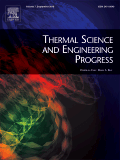
Thermal Science and Engineering Progress
Connecting researchers to the pulse of thermal advancements.Thermal Science and Engineering Progress is a premier peer-reviewed journal published by ELSEVIER, established to bridge the gap between theoretical and practical advancements within the fields of thermal science and engineering. Since its inception in 2017, this esteemed journal has rapidly ascended to a Q1 ranking in the category of Fluid Flow and Transfer Processes, positioning it among the top 17 of 96 journals in this discipline, as reflected by its impressive 82nd percentile ranking in Scopus. With a focus on disseminating high-impact research, Thermal Science and Engineering Progress aims to foster innovation and collaboration by publishing cutting-edge studies that address both contemporary challenges and future directions in thermal management, energy conversion, and heat transfer technologies. Researchers, professionals, and students alike are invited to explore the wealth of knowledge contained within its pages, which are accessible from its headquarters in Amsterdam, Netherlands. This journal plays a critical role in advancing technological progress and fostering a deeper understanding of thermal processes, making it an essential resource for anyone dedicated to these crucial areas of study.
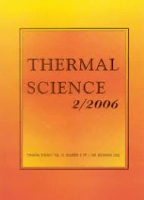
Thermal Science
Fostering collaboration in the pursuit of thermal innovations.Thermal Science is an esteemed open-access journal published by the Vinca Institute of Nuclear Sciences in Serbia. With a rich focus on the field of thermal science, this journal has established itself as a vital resource for researchers and professionals interested in the dynamics of energy, renewable energy systems, and environmental sustainability. Since its inception in 2001, Thermal Science has dedicated itself to disseminating high-quality research that addresses the challenges of contemporary thermal technologies. The journal has converged its years of publication from 2007 to 2024 and currently holds a Q4 ranking in the category of Renewable Energy, Sustainability, and the Environment, with a Scopus rank of #172 out of 270, placing it in the 36th percentile. This makes it a crucial platform for sharing innovations and findings that contribute to the development of sustainable energy solutions. With open access options available, Thermal Science ensures that knowledge is readily accessible, fostering collaboration and advancement in this critical field.
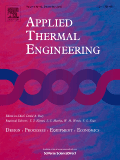
APPLIED THERMAL ENGINEERING
Unveiling the science behind efficient thermal solutions.Applied Thermal Engineering is a leading international journal dedicated to the field of thermal engineering, published by Pergamon-Elsevier Science Ltd. With an impressive impact factor indicating its significance in the academic community, this journal focuses on innovative research and developments related to energy engineering, fluid flow, and transfer processes, as well as manufacturing and mechanical engineering. Being indexed in top quartiles (Q1) across multiple categories, it ranks exceptionally well on platforms like Scopus, ensuring that contributors reach a wide and relevant audience. The journal supports both open access and subscription options, promoting the dissemination of vital research findings from 1996 to 2024. With its commitment to advancing the discipline and implementing rigorous peer-review processes, Applied Thermal Engineering serves as an essential resource for researchers, industry professionals, and students aiming to stay abreast of the latest advancements and applied methodologies in thermal science.
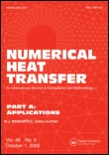
NUMERICAL HEAT TRANSFER PART A-APPLICATIONS
Pioneering research at the intersection of theory and application.NUMERICAL HEAT TRANSFER PART A-APPLICATIONS, published by TAYLOR & FRANCIS INC, serves as a premier outlet for cutting-edge research in the domains of numerical analysis and condensed matter physics. With an ISSN of 1040-7782 and an E-ISSN of 1521-0634, this esteemed journal has steadily maintained its influence in the academic community since its establishment in 1989, continuing its publication into 2024. Currently ranked in the Q2 quartile for both Condensed Matter Physics and Numerical Analysis, it stands as a vital resource for researchers committed to advancing computational methodologies and applications. The journal's Scopus rankings reflect its growing impact, particularly in mathematics, where it is placed in the top 26% of its category. Although not an open-access journal, its comprehensive research articles and detailed applications foster innovation and collaboration, making it essential for professionals and students aiming to deepen their understanding of thermal transfer phenomena through numerical techniques. This journal not only bridges theory and application but also propels forward the field of heat transfer.

Propulsion and Power Research
Unlocking Innovations in Aerospace and Automotive Engineering.Propulsion and Power Research, published by KEAI PUBLISHING LTD, is a leading Open Access journal that has been advancing the field of propulsion and power systems since its inception in 2012. With its commitment to fostering scientific discourse and innovation, the journal has gained a prominent position within academia, achieving a Q1 ranking in multiple categories such as Aerospace Engineering, Automotive Engineering, and Fluid Flow and Transfer Processes as of 2023. With an impressive ranking of #18 out of 153 in Aerospace Engineering and consistent recognition in the Scopus rankings, the journal explores critical advancements and research findings that propel the industry forward. As an Open Access publication, it ensures that groundbreaking research is readily available to a broad audience, enhancing collaboration between researchers, practitioners, and students. The journal's scope encompasses a wide range of topics within propulsion and energy solutions, making it an essential resource for anyone keen on discovering significant developments in this dynamic field.

Transactions of the Korean Society of Mechanical Engineers B
Innovating solutions for a dynamic engineering landscape.Welcome to the Transactions of the Korean Society of Mechanical Engineers B, a pivotal journal dedicated to advancing the field of mechanical engineering. Published by the esteemed Korean Society of Mechanical Engineers, this journal serves as a platform for the dissemination of innovative research and practical applications in mechanical engineering and related disciplines. With a focus on fostering knowledge exchange and collaboration, the journal publishes original research articles, reviews, and technical notes that contribute to the understanding and evolution of mechanical systems and technologies. The Transactions of the Korean Society of Mechanical Engineers B, which has been in circulation since 2007 and spans through 2024, is categorized within the Q4 quartile of mechanical engineering rankings and is indexed by Scopus, making it a valuable resource for researchers and professionals aiming to stay abreast of the latest developments in the field. Although it is not open access, its rigorous peer-review process ensures the integrity and quality of the published work, making it essential reading for academics and practitioners alike.